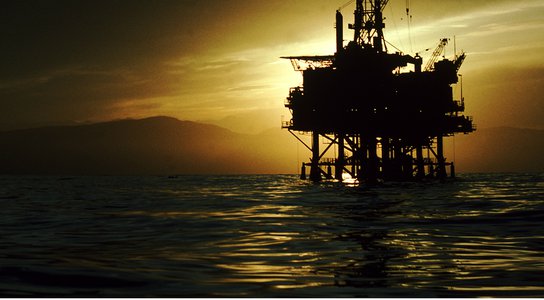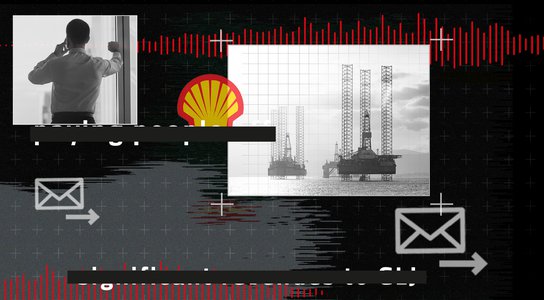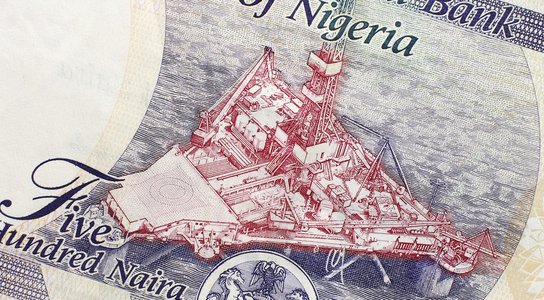New analysis has found that oil giants Shell and Eni’s controversial deal for a Nigerian oil licence included unprecedented terms which funded an alleged bribery scheme. The terms replicated military-rule era “Sole Risk” contracts, and boosted Shell and Eni’s internal valuations of the oil deal enough to justify the companies paying $1.1bn upfront.
Italian Prosecutors allege that the $1.1bn paid by Shell and Eni for the OPL 245 licence was used to pay former Nigerian oil minister Dan Etete and “intended for payment to President Jonathan, members of the government, and other Nigerian public officials”. Shell, Eni and some of their senior managers are now standing trial, charged with international corruption, with prosecution pending in other countries.
The award of military era style contracts for deep water fields to huge international oil companies appears to unprecedented since the advent of civil government in Nigeria. The deal transferred massive economic benefits to the companies at the expense of the Nigerian people by giving away Nigeria’s right to its share of the oil produced, terms which resemble ‘Sole Risk’ contracts granted only to Nigerian companies during military rule in Nigeria’s Deep Water. The Nigerian Department of Petroleum Resources currently lists the OPL 245 license as a Sole Risk type contract in its annual report.
The analysis of Shell and Eni’s valuation documents prepared before they agreed the deal in 2011 appears to show that the transfer of Nigeria’s share of future revenue to the companies was essential for the companies to be willing to pay over a billion dollars upfront, money that prosecutors say was used to pay massive bribes.
The analysis also found that the Nigerian state’s ability to buy their rights back was heavily restricted in the deal with Nigeria having to pay $650m plus interest up front to re-acquire a stake worth an estimated $2 billion in future revenue. These rights would still leave Nigeria with a far lower share of the oil production than recommended by the IMF, and 15% or $3.5bn lower than previous terms for the same license.
The analysis was carried out by expert oil consultancy firm Resources for Development, commissioned by NGOs Global Witness, HEDA, Re:Common and The Corner House using publicly available documents including Shell and Eni’s valuations of the oil block.
An analysis published in late 2018 by the same firm showed that the terms of the contract could reduce the Nigerian Government’s revenue from the fields by $5.86bn over the lifetime of the project when compared to the standard Production Sharing Contract (PSC) terms in place in Nigeria since 2005, assuming an oil price of $70 per barrel.
Emails between Shell managers at the time showed they were aware that the deal would not give Nigeria rights to the share of its oil that is usual in deals between country governments and international companies.
Nigeria’s most senior civil servant in the Department of Petroleum Resources objected strongly to the terms of the deal at the time, calling it “highly prejudicial to the interests of the Federal Government”, but Nigerian ministers appeared to have ignored or overruled these concerns. Shell managers had been briefed that the ministers who overruled civil servants to approve the deal were likely to receive bribes.
Nigeria is currently pursuing civil claims against Shell and Eni over the deal which they claim “Shell and Eni engaged in for “bribery and unlawful conspiracy” to harm the Federal Republic of Nigeria and that they dishonestly assisted corrupt Nigerian government officials.” The current Nigerian Attorney General, Abubakar Malami, reportedly suggested that Nigeria could reach a settlement with the companies with a deal including Nigeria re-acquiring a stake in OPL 245. President Buhari reportedly rejected any settlement, ordered a halt to development of the oil block until all issues are resolved and the legal process has run its course.
Barnaby Pace, a campaigner at Global Witness said, “We’ve known of allegations of vast bribery in this deal for years. Now we’ve learned that Shell and Eni profited unfairly through military era contract terms meaning that it was Nigeria’s share of oil that was used to fuel profiteering and payoffs. It is simply unacceptable that Shell and Eni should be allowed to hold on to this scandalous deal.”
“These companies and Nigerian officials agreed a sweetheart deal that deprives Nigeria of money it badly needs to build schools and pay doctors. President Buhari should reject any deal that leaves the OPL 245 oil license with these companies.” Said Olanrewaju Suraju of HEDA.
“Shell and Eni represented their OPL 245 contract as a production sharing system yet it includes no sharing of production for Nigeria. This shockingly poor deal must be cancelled.” Said Nick Hildyard of The Corner House.
"The Italian government is discouraging Nigerian migrants trying to reach Italy by claiming that it will help them at home, but Italy’s biggest multinational, part owned by the state, is accused of depriving the Nigerian people of billions. The OPL 245 scandal appears to show that Italians are not helping the poorest, but profiting from them". Said Antonio Tricarico of Re:Common
Shell and Eni were asked for their comments on the analyses. Both companies and their managers have denied wrongdoing and criminality in the deal. Shell stated that “In line with correct legal process, many of these issues will be considered by the court and we do not wish to interfere with those proceedings”.
Eni claimed in light of their ongoing trial, Eni is “unable to disclose… information relevant for the pending proceedings, nor is it otherwise willing to publicly disclose data that are sensitive in nature.” They noted that Eni appointed experts in court will “cover the significant benefits for Nigeria” from the deal and that it will be shown to be “transparent, lawful and beneficial for Nigeria”.
/ ENDS
Contacts
Notes to editor:
- Resources for Development has published its new findings in two reports, “Nigeria’s Back-in Rights to OPL 245: An Economic Analysis” and “Assessing the Value of OPL 245: Shell and Eni Valuations from 2010 and 2011”. Both are available on the Resources for Development Consulting website http://www.res4dev.com/publications/
- In 2018, in a separate fast-tracked trial an Italian court convicted two middlemen involved in the deal, Emeka Obi and Gianluca Di Nardo, on corruption charges. The court concluded that “the management of ENI and Shell” …”was fully aware of the fact that a part of the $1.092bn paid would be used to remunerate Nigerian public officials” and “This did not involve mere connivance, but a conscious attachment to a predatory project to the detriment of the Nigerian State”. The ruling does not affect the ongoing separate trial of Shell, Eni and its managers who have all denied wrongdoing. The charges against Shell, Eni, their current and former staff, Dan Etete and middlemen are available at https://shellandenitrial.org/milan-trial-documents/
- The International Monetary Fund (IMF) recommends that mature oil producing countries should receive 65% to 85% of oil revenues with the remainder going to oil companies. The current OPL 245 deal is projected to result in Nigeria receiving just 41% of revenues, while Nigeria’s standard PSC terms or the terms Shell agreed with Nigeria in 2003 would earn Nigeria 65% or 60% of revenues respectively. If Nigeria spent $870m taking up its back-in rights it would only improve Nigeria’s share from the current deal from 41% to 45%. Nigeria is currently pursuing civil claims against Shell and Eni over the deal as part of the Milan trial and in the English High Court for “bribery and unlawful conspiracy”.
- Resources for Development’s previous analysis “Government Revenues from OPL 245: Assessing the Impact of Different Fiscal Terms” was published in November 2018 and is available at http://www.res4dev.com/wp-content/uploads/2018/12/R4D-Nigeria245-GovernmentRevenueAnalysis-Final12.12.1.48.pdf. In addition to Nigeria’s losses compared to the model Production Sharing Contract in place in Nigeria the analysis found that terms from Shell’s 2003 PSC on the same block would still have earned Nigeria an estimated $4.5bn more in expected revenue over the block’s lifetime
- For details of leaked Shell emails showing that the company’s managers were aware the deal they were arranging was not a production sharing contract see Global Witness’ November 2018 report “Take The Future” https://www.globalwitness.org/documents/19524/Take_the_Future_.pdf
- Nigeria’s Department of Petroleum Resources lists OPL 245 as a sole risk contract, see p20 of https://www.dpr.gov.ng/wp-content/uploads/2018/10/2017-NOGIAR-WEB.pdf
- Shell noted that they believed that Resources for Development model included an incorrect factual assumption saying it did “not apply the capital allowance correctly in accordance with Second Schedule of the Petroleum Profits Tax Act.” (PPT Act). Shell were invited to specify what they believed was incorrect or provide their interpretation of this point. However, they declined to provide further details. Based on Shell’s response, Resources for Development reviewed the capital allowance provisions In the Second Schedule of the PPT Act and consulted with other experts. While they recognize that there may be other interpretations of these capital allowance provisions, they retained their original interpretation within their model and analysis as they believe it is in line with accounting practice and consistent with the PPT Act.
- On 17 April 2019 a Nigerian court orderedarrest warrants against former Nigerian ministers Dan Etete and Mohamed Adoke as well as managers of Shell and Eni. Mr Adoke releaseda statement claiming that he should have no case to answer as a previous civil judgement ruled a minister cannot be prosecuted for carrying out the lawful directives of the President. Eni respondedsaying the move was “disproportionate and detrimental” to the rights of its manager.
- Goodluck Jonathan’s statement addressing the allegations against him is available at http://www.premiumtimesng.com/news/headlines/220059-breaking-malabu-oil-deal-jonathan-breaks-silence-bribe-allegation.html
- Dan Etete’s response to the public allegations against him is available at: https://www.thisdaylive.com/index.php/2017/02/08/etete-government-did-not-invest-a-dime-in-malabu-oil/
- Mohamed Adoke, the former Nigerian Attorney General of Nigeria previously responded to allegations around the 2011 deal saying that the contracts were concluded following consultations with relevant ministries, no attempt was made to prevent civil servants voicing their concerns, and issues were resolved following inter-ministerial discussions. He noted that the PSA between Shell and Eni was not within his remit. He also noted that the current oil minister has reportedly written that the deal was a viable route to resolving disputes over the license. His full response can be seen on the Global Witness website.
You might also like
-
Briefing Shell and Eni's Misadventures in Nigeria
In 2011, Shell and Eni paid US$1.1bn for one of West Africa’s largest oil fields, situated off the coast of Nigeria, but the money did not benefit the country’s citizens.
-
Report Shell Knew
Emails show senior executives at world’s fifth largest company knowingly took part in a vast bribery scheme that robbed the Nigerian people of $1.1billion.
-
Briefing Shell, Eni & company executives face corruption charges
The briefing outlines the recent legal developments in Italy relating to Shell and Eni and provides background on the OPL 245 deal.